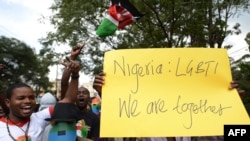Activists in Nigeria have condemned the death sentences given by an Islamic court to three men for homosexual acts. The ruling in Nigeria's northern state of Bauchi was the latest in a series of controversial death sentences by Sharia courts.
In a ruling last week, Judge Munka’ilu Sabo Ningi sentenced three men to death by stoning on charges of homosexuality.
The men are ages 20, 30, and 70 and were arrested on June 14. They were not represented in court by a lawyer before pleading guilty to the charges against them.
The ruling has sparked criticism from LGBTQ and human rights activists.
One activist, Kayode Somtochukwu Ani, said he fears the sentencing could trigger mob action against homosexuals in northern Nigeria.
"We had this crossdressing bill introduced in April, and now we're having three people sentenced to death by stoning in 2022,” Ani said. “It's getting out of hand, the fear that northern LGBTQ people have to live in at this moment."
Ani, who heads the Queer Union for Economic and Social Transformation (QUEST), said activists have been unable to reach the men and help them appeal the case. They have 30 days from the day of the sentencing to do so.
Nigeria’s northern Bauchi state is one of 12 where Sharia law is honored. But state authorities must approve the death sentence before the men are executed.
Government spokesperson Muktar Gidado did not respond to requests for comment on the case but a local journalist, speaking on condition of anonymity, told VOA that authorities have been avoiding the topic.
He also said media organizations in the north will not report the subject.
"Because of religion and culture, that one is a no-go area,” the journalist said. “The state government would be very careful regarding that issue because election is coming and anything that will dim their image, they'll be careful."
In 2020, a Sharia court in Kano state issued a death sentence, this time to a Nigerian singer found guilty of blasphemy. The defendant has asked an appeals court to overrule the decision and declare the Sharia court ruling unconstitutional.
Lakin Akintola, head of the advocacy group Muslim Rights Concerns, said even though Sharia is not widely accepted elsewhere in Nigeria, he supports the Bauchi court’s ruling.
"Why don't you allow the Muslims to live their lives?” Akintola said. “If others want to continue to destroy civilization, they're free to do so, but for crying out loud allow Muslims to be Muslims."
Another activist, lawyer Martin Obono, is calling for restraint.
"Nigeria is a secular state and people have the rights to express themselves,” Obono said. “I think essential we need to go back to the drawing board and revisit the laws and also that will help us create a society of tolerance "
In Nigeria, homosexuality is widely viewed as a Western import. Nigerian law punishes gay relationships by up to 14 years imprisonment.
Nigerian Activists Denounce Death Sentence in Homosexuality Conviction




